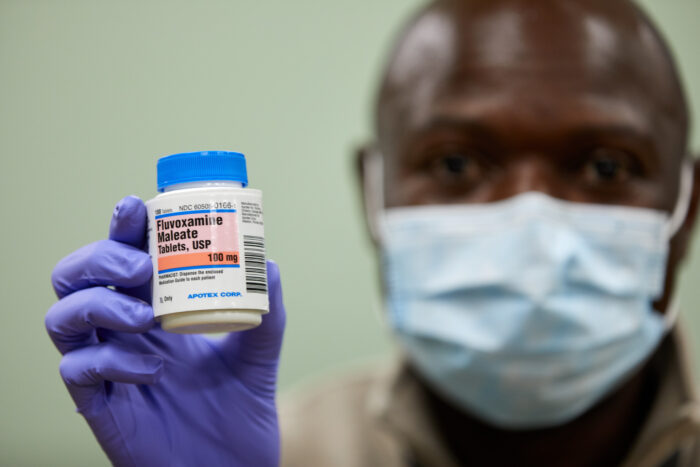Antidepressant may prevent severe COVID-19, follow-up study indicates
Low-cost drug lowers risk of hospitalizations, deaths
 Matt Miller
Matt MillerLeonard Imbula of the Healthy Mind Lab at Washington University School of Medicine in St. Louis holds a bottle of fluvoxamine, a psychiatric drug that has been shown, in a pair of studies conducted on two continents, to be an effective treatment for people sick with COVID-19.
In the largest study yet to evaluate a common, low-cost antidepressant as a treatment for COVID-19, researchers from Washington University School of Medicine in St. Louis and from Canada and Brazil have found that the drug fluvoxamine prevents some of the most serious complications of COVID-19, sharply reducing the risk of hospitalization and death.
The study’s results were published recently in the journal The Lancet Global Health.
This trial, conducted in Brazil, confirms results from the first trial of fluvoxamine for COVID-19, which was launched in early 2020 and led by Eric J. Lenze, MD, and Angela M. Reiersen, MD, both psychiatrists at the School of Medicine. Results of that trial were published in JAMA one year ago. The two were interested in the antidepressant because of its anti-inflammatory properties. They also are co-authors on the new study.
The Brazilian study followed about 1,500 patients newly diagnosed with COVID-19. Of them, 741 people received the drug — a 100 mg tablet of fluvoxamine twice a day for 10 days — while 756 received a placebo twice daily. The trial was halted early because those taking the fluvoxamine experienced far better outcomes than those taking a placebo.
Of those taking fluvoxamine, 11% became sick enough to require an extended stay at a COVID-19 emergency facility or be admitted to a hospital, compared with 16% of people who received a placebo.
In a secondary analysis of participants who took at least 80% of their pills, the findings were even more striking: Risk of hospitalization or extended emergency care was reduced by two-thirds, and there was one death among those taking fluoxamine compared with 12 deaths in the placebo group, a reduction in mortality risk of 91%.
“These numbers may represent the optimal benefit that can be achieved when patients adhere to the treatment regimen,” said Reiersen, an associate professor of psychiatry.
“Based on this replication of our findings in such a large study, we believe fluvoxamine should be considered as a treatment for patients at high risk for serious illness or death,” said Lenze, the Wallace and Lucille Renard Professor of Psychiatry and director of the Healthy Mind Lab at Washington University. “Unlike other therapies being developed to treat COVID-19, this drug has a long and well-established record of safety, and doctors could choose to prescribe it off-label for COVID-19 immediately.”
Lenze said vaccines are extremely good at preventing serious illness but that many countries have had difficulty vaccinating their citizens, and even some vaccinated people may still be at risk for serious COVID-19 symptoms due to underlying medical illness or reduced immunity over time. Fluvoxamine provides a low-cost treatment option for newly diagnosed patients and appears to be highly effective in reducing severe disease.
“As COVID-19 spread rapidly around the globe, there have been many attempts to repurpose existing drugs that might have anti-viral and/or anti-inflammatory effects; fluvoxamine is the only drug in this category that has shown promising efficacy to date,” said David H. Perlmutter, MD, executive vice chancellor for medical affairs and the George and Carol Bauer Dean of Washington University School of Medicine in St. Louis. “The original hypothesis for testing this drug and the rapid deployment methods used for the initial clinical trial represent truly remarkable ingenuity by the team of Drs. Reiersen and Lenze and, most importantly, the results point us in the direction of a safe and inexpensive oral agent to reduce hospitalizations and save lives.”
Unlike newer antiviral drugs that are reportedly promising against COVID-19, fluvoxamine would not require emergency use authorization before it could be prescribed. That’s because it already is approved by the U.S. Food and Drug Administration for treatment of obsessive-compulsive disorder (OCD) and has been prescribed for more than three decades to treat OCD, anxiety disorders and depression. It belongs to a class of drugs known as selective serotonin-reuptake inhibitors (SSRIs). But unlike other SSRIs, fluvoxamine interacts strongly with the sigma-1 receptor, a protein inside cells that helps regulate the body’s inflammatory response.
“We believe this drug most likely is interacting with the sigma-1 receptor to reduce the production of inflammatory molecules in the body,” said Reiersen. “That represents an interesting difference from other SSRIs when it comes to the treatment of psychiatric illness, but it appears to be vital to fluvoxamine’s effects in patients with COVID-19.”
The new findings come from a study known as the TOGETHER Trial — a large, adaptive platform trial that has randomized more than 4,000 patients worldwide into trials evaluating existing drugs for their ability to effectively treat COVID-19. Fluvoxamine is the first one of the potential treatments to be found effective.
“And it costs about $4 for a course of treatment, so it also can be cost-effective, unlike other, newer COVID-19 therapies,” Lenze said. “It may be particularly useful in countries where vaccination rates remain low.”
The study’s senior author, Edward J. Mills, PhD, who is a professor of health research methods, evidence and impact at McMaster University in Hamilton, Ontario, said it is important to get the drug out to hard-hit countries as soon as possible. Mills, also a vice president and senior principal scientist at Cytel, a company that makes statistical software and provides analytics for clinical trials, called fluvoxamine one of the best tools available to minimize the danger for people infected with COVID-19 around the world.








